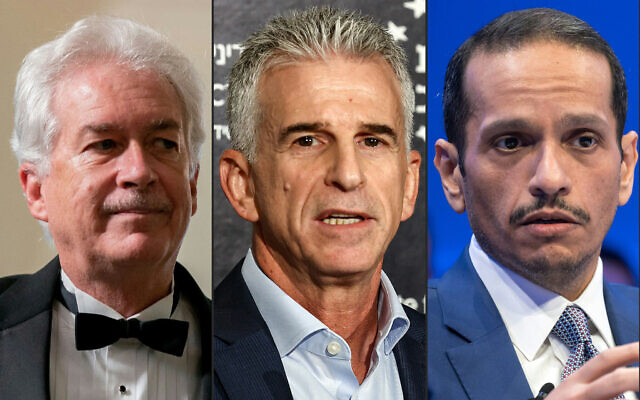



Family members of hostages held in Gaza and their allies held a raucous protest outside Defense Ministry headquarters in Tel Aviv Thursday night, a day after the government appeared to back away from ongoing talks in Cairo aimed at reaching a deal for a truce and release of the captives.
Hundreds gathered at the major intersection near the Azrieli towers in the rainy weather, with some blocking the Begin thoroughfare as they demanded the cabinet agree to a deal to see the 130 remaining hostages brought home.
On Wednesday, it was widely reported that Netanyahu had instructed an Israeli delegation not to return to Cairo for a second day of talks this week after its members met earlier this week with Qatari, US and Egyptian officials Tuesday amid the attempt to reach a deal with Hamas. Netanyahu said Hamas must first renounce its “delusional” demands of Israel.
Speaking to media outside the building, released hostage Moran Stela Yanai said, “I came here with all the pain, the devastation and a broken soul, to give you one clear message: These are our children. These are our parents. These are all of our lives. Today it’s us, tomorrow it could be any one of you.”
She continued: “I was there, I still recall the smell, the fear, the terror that struck me and continues to strike me every night and day — 54 days in Hamas captivity that felt like years of hell. Fifty-four days in Hamas captivity is not living, it’s hell. I went through hell and now they are going through hell — our brothers, our children, our parents,” she said, noting shortages in food and water, physical abuse, sexual abuse and psychological torture in captivity.
“They don’t have time,” she said. “This is your moment, members of the cabinet and the prime minister. You cannot miss the Cairo framework and the [ability] to release them. I ask you, what if they were your children? What if they were your parents? What would you do then?”
Separate protests were also held outside a number of homes of government officials, led by one of the anti-government groups that spearheaded protests against the judicial overhaul that shook the country through much of 2023.
In Tel Aviv, Ruby Chen, the father of American-Israeli hostage Itay Chen, also called on the government to send a delegation back to Cairo.
“You have to be there, to speak with each other until you reach a point where a deal can be signed,” said Chen. “Sometimes I feel, as an American citizen, that the US wants to bring a deal more than the government of Israel does. I call on the cabinet — prove me wrong.”
Chen added: “We know that Hamas’s demands are over the top, but this is just a start, and you can’t conduct negotiations via telepathy — the only consideration that needs to be weighed is saving the lives of the hostages.”
Netanyahu said in a video statement Wednesday that no advancements could be made in hostage negotiations until Hamas withdrew its “delusional” demands.
The Hostages and Missing Families Forum reacted harshly to the news, saying that the decision would mark “a death sentence” for the hostages remaining in captivity.
On Thursday, Netanyahu met in Tel Aviv with CIA director William Burns, along with Mossad head David Barnea, Shin Bet director Ronen Bar, National Security Adviser Tzachi Hanegbi and Military Secretary Avi Gil to discuss ongoing talks for the release of the hostages.
The heads of the Mossad and Shin Bet, as well as Netanyahu’s diplomatic adviser, were in Cairo Tuesday for the negotiations. A source in the Prime Minister’s Office told The Times of Israel that they were there to listen and nothing more. Those talks ended without a breakthrough.
The Palestinian terror group’s demands include moves toward a permanent ceasefire, a withdrawal of troops from Gaza, reconstruction of the enclave and the release of some 1,500 Palestinian prisoners, among them numerous convicted killers and terror masterminds, in exchange for the remaining hostages taken on October 7. Israel has said such demands are non-starters.
Quoting US and Israeli officials, the Axios news site reported late Tuesday that the key sticking point in the negotiations is the release of Palestinian prisoners, with US President Joe Biden telling Netanyahu on Sunday that while Hamas’s demands went too far, Israel could demonstrate more flexibility, and will likely have to free more Palestinians per hostage than a previous deal in November that saw 105 civilians released by the terror group.
Israel has made destroying Hamas’s governing and military capabilities and freeing the hostages the main goals of the war, which began when thousands of Hamas terrorists rampaged through southern Israel on October 7, killing 1,200 people, mostly civilians, and taking 253 others captive, including women and children. Tens of thousands of Israelis were displaced from destroyed communities.
The war has wrought massive destruction in the Gaza Strip, with more than 28,000 people killed, according to Gaza-based Hamas health officials. That figure cannot be independently verified and includes some 10,000 Hamas terrorists Israel says it has killed in battle and as a consequence of the terror groups’ own rocket misfires. Israel also says it killed some 1,000 gunmen inside Israel on October 7.
Agencies contributed to this report.


